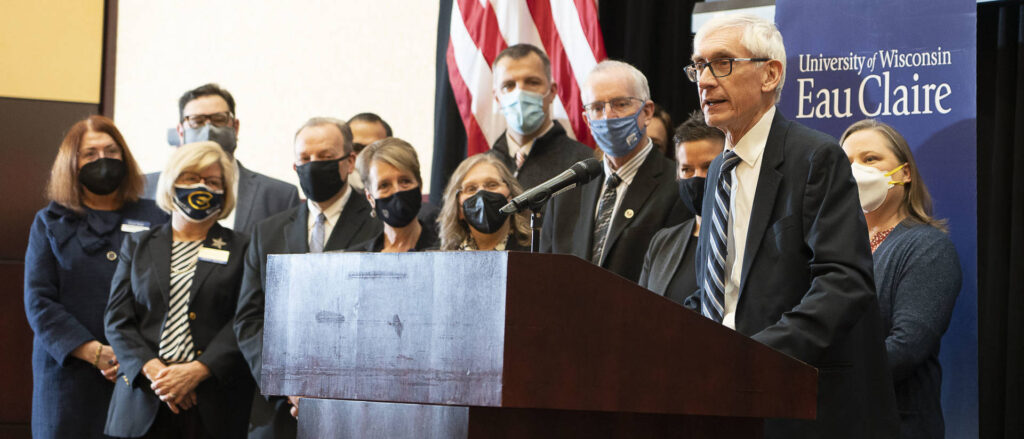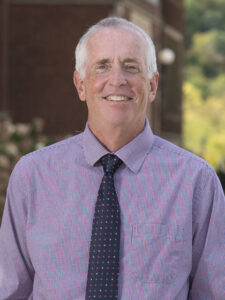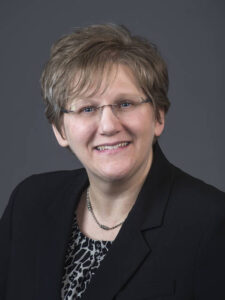 The University of Wisconsin-Eau Claire received a $9.4 million grant from the Wisconsin Economic Development Corp. through the agency’s Workforce Innovation Grant program. Gov. Tony Evers announced UW-Eau Claire’s award at a press conference on campus on Dec. 14. UW-Eau Claire’s three-year award, the first of 12 such grants announced across the state, will focus on strengthening the workforce for rural health and wellbeing.
The University of Wisconsin-Eau Claire received a $9.4 million grant from the Wisconsin Economic Development Corp. through the agency’s Workforce Innovation Grant program. Gov. Tony Evers announced UW-Eau Claire’s award at a press conference on campus on Dec. 14. UW-Eau Claire’s three-year award, the first of 12 such grants announced across the state, will focus on strengthening the workforce for rural health and wellbeing.

Dr. Mike Carney
When Dr. Mike Carney first met with Dr. Carmen Manning to develop UW-Eau Claire’s proposal, their goal was to craft a bold plan to address the significant needs of rural communities tied to education, health care and small business success.Carney and Manning knew the only way their bold plan could become a reality was for UW-Eau Claire to lean into the expertise of its faculty and staff and the broad network of partners and collaborators that have helped shape the university for decades.
Carney, assistant chancellor for strategic partnerships and program development at UW-Eau Claire, said he was thrilled to learn from the Wisconsin Economic Development Corp. that UW-Eau Claire’s proposal had been selected for funding.
“I was speechless,” Carney said after learning the good news last week. “We put a lot of thought and planning into our proposal. Receiving a grant of this magnitude is a huge step forward for UW-Eau Claire and all the partners we will work with to make this a success for rural communities across northwestern Wisconsin.”
Manning, dean of the College of Education and Human Sciences at UW-Eau Claire, said collaboration is at the heart of UW-Eau Claire’s grant proposal, which seeks to respond to the crisis in rural areas that have been disproportionately affected by the pandemic by providing a comprehensive strategy to address immediate and medium-term solutions to critical workforce needs and a long-term strategy to foster innovation and design-thinking in new and existing businesses.

Dr. Carmen Manning
“We quickly recognized that collaboration with our partners, from Mayo Clinic Health System to school districts and county social services agencies across the region to small business networks, was key to the success of the proposal,” Manning said. “After multiple conversations with our faculty and staff, our partners and regional economic development directors, we outlined a holistic approach to supporting health care, education and the economy in 16 counties across northwestern Wisconsin. These conversations were critically important to framing our proposal and reinforced the fact that we are successful when we build upon the partnerships we have developed in this region.”
UW-Eau Claire’s project will address the three critical needs outlined in Gov. Evers’ 2020 Commission on Rural Prosperity; health care, education and small business development, all of which have been negatively impacted by the COVID-19 pandemic over the past two years. As school and county human service agencies face a dwindling number of teachers and social workers, small businesses confront worker shortages and pandemic challenges and experts anticipate a spike of nurse retirements across the country, rural communities in Wisconsin are facing a perfect storm.
“From my first day as chancellor, I have professed my belief that regional comprehensive universities exist to serve the Public Good,” Chancellor James Schmidt said. “Our graduates are the public servants, teachers, healthcare workers, civic leaders, and entrepreneurs who sustain growing communities. The grant fits perfectly into our 2025 Strategic Plan as we focus on bold, innovative goals that help our campus and our communities move forward.”
The four pillars of the project include addressing workforce shortages for nurses, teachers and social workers in rural communities; developing new degree programs and career pathways at UW-Eau Claire in high-demand health care fields; piloting a health care delivery model based on technology-enabled health care hubs and “care coaches” trained to facilitate bidirectional communication between provider and patient; and creating innovative curriculum and providing entrepreneurs and local business owners with business services and innovation support to better weather future economic challenges.
In collaboration with Mayo Clinic Health System, our 13 regional school districts and seven social services agency partners and WiSys Technology Corp., UW-Eau Claire’s Workforce Innovation Grant project details multiple initiatives to combat the challenges communities face in northwestern Wisconsin. Those initiatives include:
- Educating and graduating 48 more nurses each year, with 144 in training by 2025. This will increase UW-Eau Claire’s bachelor’s-prepared nurses to 160 per year. UW-Eau Claire will partner with Mayo Clinic Health System to innovate clinical nursing education through use of dedicated education units (DEUs), in which Mayo nurse educators provide front-line clinical instruction to nursing students with oversight by UW-Eau Claire faculty, and through increased use of technology-enabled simulation instruction.
- Providing tuition support for 10 nurse educators to complete their master’s degrees and serve as clinical faculty with undergraduate nursing students.
- Offering tuition support to 600 students during their internship or student teaching placements to enhance the recruitment and retention of teachers in 13 rural school districts (Abbotsford, Barron, Colby, Clear Lake, Durand-Arkansaw, Edgar, Eleva-Strum, Elk Mound, Gilmanton, Greenwood, Independence, Mondovi, Whitehall) and social workers in seven counties (Barron, Burnett, Pierce, Polk, Rusk, Washburn, Wood).
- Piloting six iterations of a rural interprofessional practice network where student teachers, social work interns and practicum students in health care fields live and work together in rural communities during their clinical experiences.
- Establishing a rural teacher support network to mentor early career teachers and help them be successful in rural schools.
- Developing six new high-skill degrees, including a master’s in public health, a doctor of nursing practice in psychiatry and mental health, a master’s in exercise physiology, an MBA emphasis in health care management, a speech-language pathology assistant program and an online nurse educator program.
- Innovating health care delivery by identifying five community partners to design and pilot care hubs and train “care coaches,” including 15 medical assistants who will be upskilled in the launch of the program.
- Creating an “innovation certificate” and utilizing interns in UW-Eau Claire’s Small Business Development Center to network with WiSys’ VentureHome at Eau Claire’s Co-Labs to work with hundreds of existing small businesses and potential startups in the region.
Carney said the grant includes funding for a grant administrator, who will oversee general grant management and communication to ensure accountability and maintain progress toward the key milestones and goals.
“We are ready to hit the ground running,” Carney said. “We are thrilled to receive this grant, and we are excited to collaborate with our partners and begin addressing some of the significant needs that exist in the rural communities of northwestern Wisconsin.”
